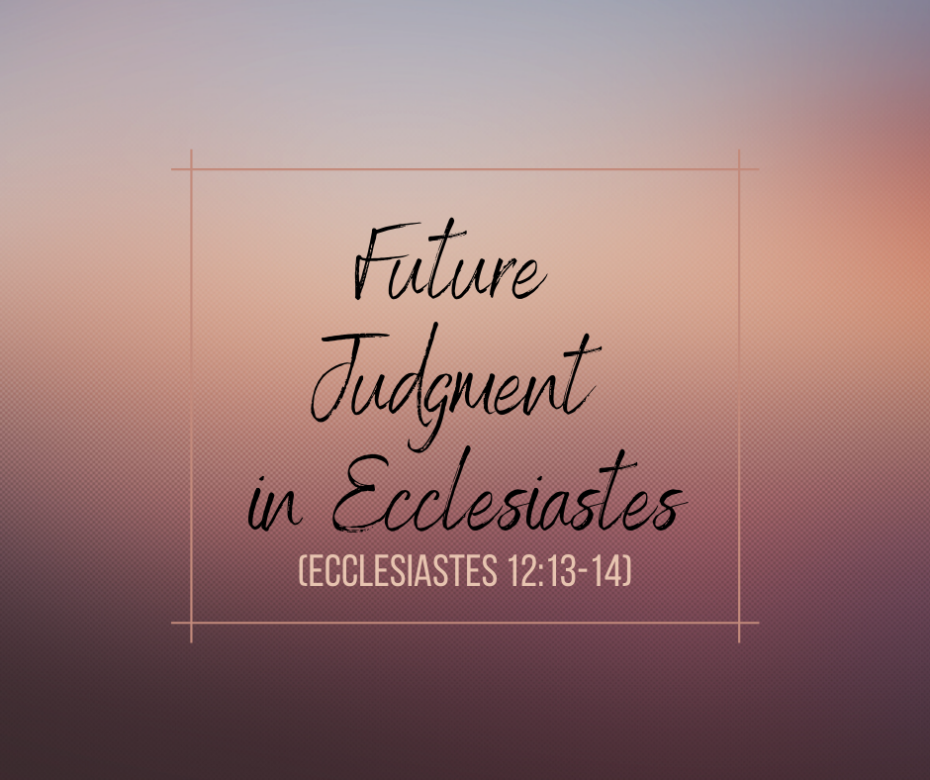Although Ecclesiastes is written from the perspective “under the sun,” you do see some glimpses of eternity.
As I wrote in an earlier blog, Solomon did mention life beyond the sun, and how God put a longing for eternity in our hearts:
He has made everything beautiful in its time. Also He has put eternity in their hearts, except that no one can find out the work that God does from beginning to end (Eccl 3:11).
If you try to find the entire meaning of your life under the sun, you will be profoundly disappointed, as was Solomon. We all long for something more—for significance that will outlast death. That is, we long for eternity.
But in Ecclesiastes that’s just the barest glimpse of life beyond the sun. However, there is another.
Ecclesiastes speaks of God’s future judgment.
I said in my heart, “God shall judge the righteous and the wicked, For there is a time there for every purpose and for every work” (Eccl 3:17).
Rejoice, O young man, in your youth, And let your heart cheer you in the days of your youth; Walk in the ways of your heart, And in the sight of your eyes; But know that for all these God will bring you into judgment (Eccl 11:9).
Fear God and keep His commandments,
For this is man’s all.
For God will bring every work into judgment,
Including every secret thing,
Whether good or evil (Eccl 12:13-14).
Bill Fiess has argued that this is a reference to the Judgment Seat of Christ, where believers are rewarded for the works they do. Indeed, there is a strong similarity between Solomon’s words and Paul’s:
Therefore judge nothing before the time, until the Lord comes, who will both bring to light the hidden things of darkness and reveal the counsels of the hearts. Then each one’s praise will come from God (1 Cor 4:5).
Ecclesiastes refers to God judging “every secret thing,” while Paul refers to judging “the hidden things of darkness.”
Elsewhere, Paul wrote:
For we must all appear before the judgment seat of Christ, that each one may receive the things done in the body, according to what he has done, whether good or bad (2 Cor 5:10).
Hence, there will be future judgment for what you have done under the sun—whether “good or evil” (Eccl 12:14) or “good or bad” (2 Cor 5:10).
Make you nervous?
Whatever judgment Ecclesiastes is referring to, the very idea of a future judgment gives the reader a hint that death is not the absolute end of things. If it were, there would be no need for judgment, for it would be too late. Instead, judgment assumes that your labor under the sun is significant—at the very least, that it’s worth evaluating, and what’s more, that there are consequences of your labor (eternal consequences?) that follow the judgment and extend beyond the sun.
Solomon doesn’t give you many details about that judgment—he only hints at it, leaving the reader with some serious questions. “Wait a second: I should eat, drink, and be merry…but I’m also going to be judged for it” (cf. Eccl 11:9). And that might be the point. As I, in an earlier blog, quoted Peter Kreeft as saying the purpose of Ecclesiastes may be to raise those big existential questions about life’s meaning and purpose and direction, especially for people who might only be skimming through the surface of life, expecting to one day find meaning if they were only smart enough or rich enough or powerful enough, and here comes Solomon to say, “I tried it, and it didn’t work!” So Ecclesiastes prods the reader’s conscience, leaving it with nagging questions the rest of the Bible can answer.
It also suggests that two of Solomon’s premises are false. I said that Ecclesiastes can be put in the form of a syllogism:
Premise 1: All labor is under the sun (Eccl 1:3).
Premise 2: All under the sun is vanity (Eccl 1:14).
Conclusion: Therefore, all labor is vanity.
But if our works are judged after death, and if that judgment results in consequences that last for eternity, then all labor is not merely under the sun (contradicting Premise 1). Moreover, if our labor has consequences that continue after death, and so are not ended by death, then they are not vain after all (contradicting Premise 2).
In any case, the questions posed by Ecclesiastes need to be answered, because they are questions about the purpose of life. And that is what our culture is wondering right now. People are trying Solomon’s experiments for themselves, and many have come to the same hopeless conclusion. What now?
I recently shared some of Ecclesiastes’ darker passages with an atheist who self-identified as a philosophical pessimist. “That’s in the Bible?” he said in surprise. “I guess I’m going to have to read the Bible.


